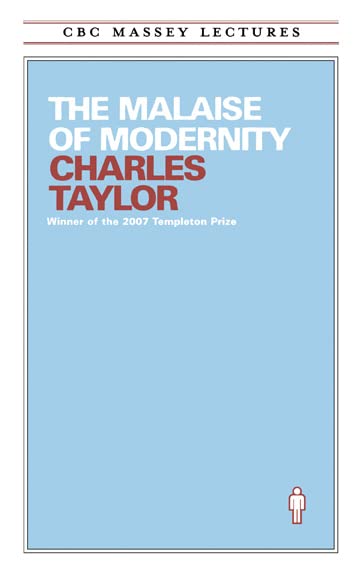

The Malaise of Modernity (Cbc Massey Lectures Series)
B**S
Balanced perspective on an uphill battle
Taylor seeks to counter pronouncements of the death of Man by the likes of Allan Bloom’s <i>Closing of the American Mind</i>. He seeks to do this with practical reality and a genealogy of “authenticity” at the root of individualism’s latest quest for identity. Taylor argues that origins of authenticity have moral foundations in Enlightenment that all moderns, including Bloom, would see as indispensable. However, Taylor agrees with Bloom that the current state of this authenticity is a narrowed and flattened individual. Individuals self-defined, without community, by the exercise of free choice alone. Where choice trumps substance based on the hollowness of “moral subjectivity,” mere difference, and the predictable disconnection from others and a higher calling (the very conditions for significance) that individualism is bound to foster. All “deviant products of the ideal of authenticity,” he writes.But excess individualism is only half the problem. Maximized efficiency, what Taylor calls “instrumental reason” is seen as the other half. Together these form Max Weber’s disenchantment of the world where sacred structure is dead, relations with men and nature are lost to utility, and “creatures that surround us lose significance in the chain of being, open to treatment as raw materials,” writes Taylor. His goal is to show while our social structure tilts strongly in these directions (dehumanization of over population, mega cities, capitalistic urge, etc.), we can fight uphill against them. But to do that we’ll have to reject moral subjectivity, realizing some ways are superior, built on values substantiated by reason.Taylor submits that “authenticity” was born around 1800 based on Descartes earlier individualist ideal of “dispassionate rationality.” A kind of self-responsible thought for oneself, and the root of scientific investigation. Locke’s political individualism prior to social obligations, authorities, and creeds also played a role. It was around this time that authenticity was part of an evolution in morality. That humans come with an internal moral sense as opposed to calculating the consequences of divine reward and punishment. Modernity takes us from St. Augustine to Rousseau. It says our moral sensibility is in us, not external (inklings of humanism, secularity, and agnosticism). But at the same time, authenticity gets mixed in with the passions of Rousseau’s Romanticism, critical of disengaged rationality, atomized community, and death of awe.As a practical matter, Taylor says we don’t want to lose the benefits of individualism or efficiencies that make life easier to tolerate. Marxism demonstrated what happens when trying to force modern individuals back into the commune. Which is not to say we shouldn’t file off modernity’s sharp edges, and if we don’t the West will continue its path to big trouble of another sort. But free societies will never be monolithic unless we fancy tyranny again. Rational argument can revive authenticity by what it was based on, but not everyone’s going to come along. What’s needed is what’s in shortest supply: leaders with a clue of what’s going on. With echoes of Toynbee, Taylor writes, “Governing a contemporary society is continually recreating a balance between requirements that tend to undercut each other, constantly finding new solutions as the old equilibria become stultifying. There can never be…a definitive solution.”
R**T
Very pleased
It’s pretty simple, I received what I ordered in very good condition very quickly.
J**U
Malaise - a book that helps us to regain our moral self
Everybody - or almost everybody - feels there is a malaise, about what is being called "modernity". The term conveys something positive. Who would not wish to participate in modernity??? But Taylor is not subservient to the power of the media (who get their instructions from Washington). He tears the veil away from that "modernity". He shows that it is nothing but an ideology, the ideology, of course, of our time. There have been so many modernities in history: the Middle Ages, the Inquisition, the French Revolution ("La Terreur"), Stalin, Hitler, and such innocently looking movements as Futurismo. With all of them claiming to be "modernity" in their time. The list is not yet exhausted: Today, they are called Democracy, Human rights, etc. They are there, made and manipulated by POWER to impose its view on us, to impose its rule on us. This book makes truly liberating reading. I would wish many were to read it, so that they became "indignated", like my friend Hessel, and start opposing POWER. Power is located in Washington. Power makes use of our moral sentiments. Its aim is to destroy its (i.e. power's) political and economocal enemies.The book is of course not perfect. At moments, Taylor hesitates to give full weight to his thinking, The reader can.
C**N
Very poor condition for used
Poor condition for used book
A**R
Five Stars
Wonderful book.
Trustpilot
3 weeks ago
2 weeks ago